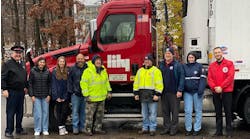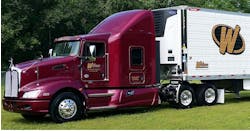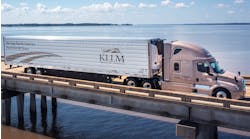These are challenging times for companies that haul and distribute refrigerated goods. A long recession and slow recovery have put financial pressure on every link in the cold chain.
Fuel costs are up 13% this year, and the Energy Information Administration sees even higher prices ahead. Refrigerated truck and reefer trailer operators are finding it difficult—if not impossible—to pass their higher operating costs on to customers, putting pressure on margins that were already razor-thin. Safety has become a national priority, underscoring the importance of protecting food and other perishable loads without raising prices at the consumer level.
In short, it has never been more challenging, more expensive, or more important to keep shipments cold on the road. So there has never been a better time to consider using “green” technologies and energy-saving practices to reduce fuel consumption, carbon emissions, and total ownership costs.
New refrigeration technologies save fuel and reduce emissions
Today’s refrigerated trucks and reefer trailers are cleaner, quieter, and more energy-efficient than those built even a decade ago, thanks to improvements in design, insulation, and refrigeration technology.
The typical refrigeration system manufactured today uses non-ozone-depleting refrigerants and can run on a 5% biodiesel blend. Today’s systems are estimated to be 85% quieter and 10% to 20% more fuel-efficient than previous-generation units. System suppliers are designing systems to meet Environmental Protection Agency (EPA) Tier 4 Non-Road Emission Standards scheduled to take effect in 2013.
For example, the latest multi-temperature units for trucks use scroll compressor technology that creates multiple temperature zones, offers electric standby capabilities, and incorporates other energy-saving features to reduce fuel consumption. They use Tier 4 engines that manufacturers say reduce particulate emissions by an estimated 38% and cut carbon monoxide emissions by an estimated 54% compared with earlier engines.
Other technological advancements include electric standby systems, which have dramatically increased in popularity in the past several years. Where the electrical infrastructure is available, plugging the refrigeration unit into the grid during extended stops, including during loading and unloading, has proven to reduce emission, noise, and fuel consumption levels and help extend the life of the unit.
Meanwhile, today’s advanced software, microprocessor, and communications technologies enable operators to use a personal computer and the Internet to monitor and remotely manage refrigeration units on a single piece of rolling stock or an entire fleet from a central location.
Haulers upgrade fleets for better performance, lower costs
Some haulers are choosing to replace their aging refrigeration units to reduce operating, service, and maintenance costs and take advantage of enhanced features such as the ability to pre-cool trucks and trailers, set specific temperatures for multiple payloads, and control the system remotely.
Haulers who operate in California have an additional incentive to consider replacing their older units. Last year, the California Air Resources Board (CARB) began requiring any haulers operating in the state to replace or upgrade refrigeration units that are more than seven years old. They granted an exception for units with electric standby capabilities that follow a specific protocol for using electric standby and maintaining appropriate records.
Several other solutions are available to reefer trailer operators who need to comply with CARB rules. For example, they can realize significant savings by working with an original equipment manufacturer to update the refrigeration unit’s diesel engine rather than replace the entire unit. Some operators can meet the new standard even more economically by installing a diesel particulate filter on the reefer unit’s exhaust system.
Operators can also improve fuel efficiency and reduce carbon emissions by updating temperature control systems. With today’s technology, fleet managers can easily set the temperature, airflow, and operating mode that are most appropriate for the type of cargo they are carrying. In its most efficient mode, an automated system gauges the temperature of return air and cycles the refrigeration unit on and off to maintain a consistent temperature within the setpoint range. This feature can deliver fuel savings of 50% or more, according to manufacturers’ estimates.
Emerging technologies promise cost, environmental improvements
Advances in electric standby and lithium-ion battery technologies set the stage for over-the-road hybrid electric systems, which represent a breakthrough in refrigerated transportation technology. Hybrid electric systems use stored energy from the truck chassis battery system to provide electric power to run the truck or reefer trailer refrigeration system. These systems can cut fuel costs and emissions by up to 50%, according to their manufacturers.
Dallas TX-based Dean Foods, which operates one of the country’s largest refrigerated fleets, is taking things a step further with a pilot program launched in summer 2010. As part of its 13,000-vehicle fleet, Dean’s is testing a delivery truck equipped with one of the first prototype diesel-free hybrid electric refrigeration systems. The system, which does not use a diesel engine, is expected to reduce total fuel costs by 50% and eliminate 21,000 pounds of carbon emissions per vehicle per year when it enters the commercial market.
Cryogenic-powered refrigeration systems represent the next big game-changer in the refrigerated transportation industry. First introduced in the mid-2000s, cryogenic systems use innovative technologies to deliver a wide range of benefits for haulers, including a significantly higher cooling capacity and temperature pull-down and recovery times estimated to be three times faster than conventional diesel units. Because its groundbreaking design replaces the diesel engine, compressor and commercial refrigerant found in a conventional system with reclaimed carbon dioxide, a cryogenic-powered system has almost no carbon footprint of its own.
Common sense approach can help haulers go green
In most cases, refrigeration technology upgrades pay for themselves over time in performance improvements and reduced fuel, service, and maintenance costs. But operators can multiply the impact of their environmental and fuel-efficiency efforts by adopting, communicating, and reinforcing good practices across their fleets.
There is little or no cost to using simple techniques such as keeping door openings to a minimum, installing automatic door switches and using strip curtains to help keep cool air in and prevent warm or humid air from entering the trailer during loading and unloading.
Good loading practices, such as placing items that need to be kept coldest near the front of the truck or trailer, can help ensure adequate air flow and consistent temperatures. It often makes sense to use pallets or install airflow guides to ensure proper air circulation throughout the truck or reefer trailer.
Truck and trailer refrigeration systems are designed to maintain products at a specified temperature, not cool them down. So it is much more energy-efficient to cool products to their ideal delivery temperature in a warehouse and load them into a pre-cooled truck or trailer.
Using shore power whenever it is available is another effective way to reduce energy costs, since utility companies provide the most economical power source available. Too often, operators invest in electric standby systems but fail to use them consistently, which undermines their energy-saving potential.
Understanding a particular system’s operating modes and choosing the right one for the load type can help a fleet manager or driver ensure that the system is set appropriately for the job it is intended to do. Following the manufacturer’s operating guidelines and adhering to recommended service intervals is essential to ensuring that a refrigeration system operates effectively and efficiently throughout its intended service life.
Saving energy and protecting the environment is an easy choice
The challenges facing the refrigerated transportation industry are not going away any time soon. But by making the best use of the refrigeration systems they already have, planning their future technology investments, and implementing good practices, fleet managers can reduce their fuel costs, improve their companies’ bottom lines, and protect the environment—all at the same time.
The opinions expressed in this article are not necessarily those shared by Refrigerated Transporter staff or Penton Media. Articles such as these merely serve as a vehicle for the expression of ideas by people involved in the industry. Refrigerated Transporter welcomes feedback from readers.
Doug Lenz is director of product management for Thermo King Corporation, an Ingersoll Rand business. Thermo King manufactures transport temperature control systems for a variety of mobile applications, including trailers, truck bodies, buses, shipboard containers, and railway cars. The company operates 10 manufacturing facilities and 17 parts distribution centers worldwide. Sales and service is provided by a global dealer network of 865 independently owned companies in 75 countries.



